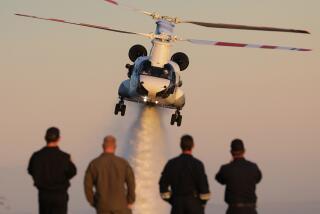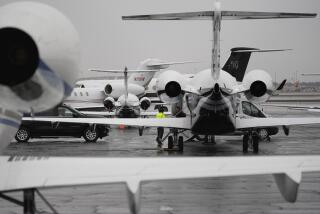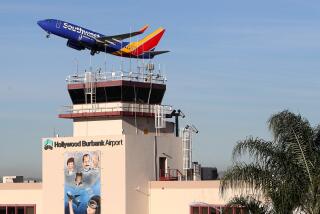FAA Challenges Colorado Airport’s Ban on After-Dusk Landings by Private Planes : Aeronautics: Aspen-Pitkin County officials call the curfew a safety measure. The federal agency says it is unfair. Funding is at stake.
- Share via
ASPEN — It’s been a good many years now, but Rick Davis can’t shake the chill he gets when recalling that one particular descent into the Aspen-Pitkin County Airport.
It was past dusk, and Davis, having threaded through a forest of snowcapped peaks, was maneuvering his small plane down the curvy Roaring Fork Valley toward the runway. Suddenly, the darkness thickened, and Davis could not distinguish the mountains from the dancing shadows.
“I got a distorted perception of the terrain,” he remembered. There was “this terrible claustrophobic feeling, like everything was narrowing in on me.”
Davis, now acting manager of the airport, touched down safely minutes later. But many others meet a different fate. Pitkin County, a region of towering peaks, plunging valleys and schizophrenic wind currents, is littered with the rusting carcasses of planes whose pilots were outmatched by the unforgiving conditions.
Pitkin County officials long ago barred private planes from landing in their treacherous neck of the woods after dark. The curfew, they say, is a vital safety shield both for inexperienced pilots and for residents in the flight path as well.
The Federal Aviation Administration, however, doesn’t see it that way. In a mushrooming battle being watched by aeronautical groups nationwide, the FAA has concluded that the curfew discriminates against general aviation pilots and has ordered Pitkin County to do away with the restriction.
Federal officials say the curfew is unfair because it allows commercial airlines to land until 11 p.m. while banning private planes 30 minutes after sunset. Unless the landing time is equalized, Pitkin County will lose FAA funding for future airport construction projects and may be sued for $11 million in federal money spent over the past 20 years, the agency has warned.
“What we want is for them to treat all aircraft alike,” said Mitch Barker, spokesman for the FAA’s regional office in Seattle.
Conceding that they have a David-and-Goliath war on their hands, Piktin County commissioners nonetheless are determined to persuade the FAA to make an apparently unprecedented finding that safety considerations mandate a different standard for different aircraft.
“We realize we’re breaking some new ground, but we believe the FAA has erred in assuming that this is a safe airport for any pilot, whether it’s a doctor flying in for vacation from Wichita or a commercial pilot with 10 years of experience,” Commissioner Wayne Ethridge said. “If you accept the FAA’s logic, you’d have to conclude that anyone who drives a car could drive in the Indy 500.”
Because of its famed ski slopes, Aspen draws a steady flood of private pilots vacationing with their families. Many of these so-called “flatlanders” are unfamiliar with mountain navigation and unaware of the altitude’s effect on the performance of their aircraft, local pilots said.
Between 1980 and 1988, 22 plane crashes, claiming 20 lives, occurred in Aspen or the immediate vicinity, according to the National Transportation Safety Board. On April 27 of this year, a single-engine Cherokee carrying six passengers slammed into the Continental Divide 11 miles from town. No one survived. Nearly all of the wrecks involved general aviation craft.
“Maps of the accidents look like people have taken a pepper shaker and sprinkled it all over the mountains,” said John McBride, an Aspen businessman and veteran pilot who is on the county’s air-rescue team. “Probably 95% of those accidents were caused by pilot error.”
The FAA has been aware of the Aspen curfew for years, but took no action against the county until receiving complaints from two organizations of general aviation pilots--the National Business Aircraft Assn., which represents corporate aviation, and the Aircraft Owners and Pilots Assn. The curfew, these groups told the FAA, is unfair.
“It’s pure discrimination, and we won’t take it,” said E.H. Haupt, manager of airport and environmental services for the NBAA in Washington. Haupt conceded that Aspen “has an interesting approach” that is “not for a flatlander,” but argued that “our people are just as qualified as those on the commercial carriers to get in there.”
In a stern letter in March, the FAA warned Pitkin County to eliminate the discriminatory curfew. If the county refused, it could say goodby to future FAA funding and risk a lawsuit forcing repayment of millions used in recent years for runway lighting, navigational aids and other improvements.
In response, Pitkin County officials are considering equalizing the curfew at 10 p.m. for both commercial and private planes. That prospect, however, has angered Continental Express and United Express airlines, the two carriers that service the ski town.
Aspen residents, meanwhile, have urged the commission to stand firm, with rock musician Don Henley, who owns a home in town, reportedly coughing up money for the fight. The support is not surprising. Many locals remember well the time a plane plunked down in the midst of the Brush Creek subdivision, killing four people. And few have forgotten that just last year a Federal Express pilot crashed into the hillside a whisker away from the exclusive Red Mountain neighborhood.
Many local aviators, noting that they avoid flying into Aspen at night, endorse the curfew. Realtor and pilot Kent Kelly, however, says, “an imprudent pilot can kill himself during the daylight hours just as easily (as at night), and it’s not the county commissioners’ job to legislate against that possibility.”
“I believe the curfew hurts tourism here, in addition to being blatantly discriminatory,” said Kelly, who accused the commissioners of using safety as a smoke screen for their true intention--to keep a lid on air traffic.
In the end, county officials predict the dispute may well wind up in court. County Manager Reid Haughey realizes the odds of prevailing are poor, but figures it’s time somebody challenged the mighty FAA.
“This isn’t Lawrence, Kan. What the FAA is protecting here is the legal right of any private pilot to splatter himself on the side of the mountain,” Haughey said. “Well, we don’t think much of that argument.”
Times researcher Ann Rovin in Denver contributed to this story.
More to Read
Sign up for Essential California
The most important California stories and recommendations in your inbox every morning.
You may occasionally receive promotional content from the Los Angeles Times.













